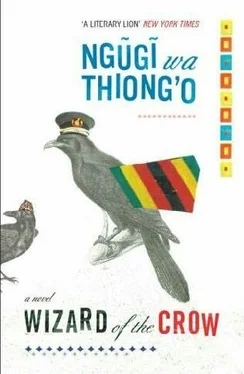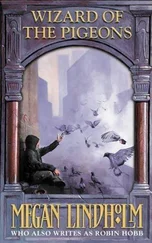“Don’t take the police for fools. They know when one is serious and when one is not. They know that words have surface and deeper meanings. The habit of taking bribes has taught them the language of parables. When a policeman wants a bribe he does not say, Give me a bribe; he says, It is very cold today, even if it is as hot as hell. And you are supposed to say, Why don’t you take this Burl note for tea? So, although you did not say yes directly, the police knew that your no was a kind of yes. You see, they recognized that you knew what they know: that even walls can have ears. You are a very cautious person, Mr. Witch Doctor, a wise man. Haste is the mother of failure. But while caution is good, too much of it can court danger. Believe me, my friend, whatever you tell me, it will stay within these walls. Nobody will ever know that you or any witch doctor helped us capture Nyawlra.”
“Mr. Minister,” cried out the Wizard of the Crow. “Let us try this again: my powers are for protecting the laws that govern the body and the soul, and yours are to protect the laws that govern society. I look not for those that break the law of society but those that destroy the law of life. I fight illnesses; you fight criminals.”
Sikiokuu felt his hope fall and his anger mount and, with a tremendous effort of will, prevented himself from screaming abuses at the audacious fellow.
“Mr. Wizard of the Crow, you may be the greatest sorcerer in the world, but you are not above the law. The law says that every citizen, be he a sorcerer or a priest or whatever, must help the State in apprehending criminals. If one sees a person committing a crime and one does not report the person to the authorities, then one is also committing the crime.”
“What I’m telling you is the truth. I don’t have the power that you are ascribing to me,” the Wizard of the Crow said, his raised voice hinting at defiance.
Sikiokuu stood up abruptly and walked about, occasionally pulling and pinching his ears nervously, as if he could not believe that he, a senior cabinet minister in the government of the Ruler, now in charge of the country, could be sitting in his office at night arguing with a sorcerer about the use of witchcraft. He calmed himself and sat down, intent again on achieving what he had set out to get.
“Okay, let’s accept that there was indeed a misunderstanding. So what? Let’s forget the past. What’s done is done. No sense crying over spilled milk. Isn’t that the saying? I need to ask you a question or two just to clarify the situation. You are not refusing to help the government, are you?”
“No.”
“Okay just as I thought. You are a power to reckon with, but you also know how to reckon with power. Now look into your mirror and tell me what you see in there.”
“I did not bring my mirror,” said the Wizard of the Crow.
“Why the hell did you come here?” exploded Sikiokuu, no longer trying to cover up his chagrin. “To waste my time, or what? My instructions that you bring your mirror were loud and clear.”
The Wizard of the Crow was about to remind the minister that his presence here had been forced, but he thought the better of it. Nyawlra’s life, after all, hung in the balance. If the minister were to keep sending his men to the shrine every other day, Nyawlra would continually be in danger. So instead of open defiance, he employed a different tactic.
“It is not their fault,” the Wizard of the Crow said. “They told me to bring my mirror, but I assured them that I could use any mirror ready at hand. In most cases it is actually better, more effective, to use the mirror of the person afflicted, for such mirrors have the added advantage of having already captured the shadows of their owners.”
“That’s good,” Sikiokuu said, somewhat mollified. “In my apartment are many rooms, and each has a mirror. When we work late and we are too tired to go home, we spend the night here. Our apartments are really extensions of our offices. Which reminds me, oh, please forgive me for being such a bad host. Would you like a drink? Beer? Whiskey? Wine? Whatever you like!”
“No, thank you. I don’t drink. Alcohol is not my personal savior.”
Sikiokuu went into some other room, laughing. Even when he came back carrying a mirror he was still laughing.
“Alcohol is not your personal savior?” Sikiokuu asked, handing over the mirror. Then, all about the business at hand, he became deadly serious. “I want you to look at this mirror. Look all over it until you see Nyawlra. If you find her, I shall make sure that whatever you want is yours: money, shares in a company, a farm in an area formerly for whites only, a building plot or two in Eldares-the choice is yours. Okay? And remember that if I ever rise to a higher office I will make sure that you become chief government witch doctor. Count on it. I shall reciprocate your good deed today”
He talked as if words came out first and thought followed, although just now it was more like thought had become tired of following words and got stuck in only one desire: the way to Nyawlra’s lair. Strange that the tone of one man’s voice could carry such a mixture of prayer, bribe, threat, fear, and ambition.
It was clear to the wizard that Sikiokuu was desperate, capable of anything, so he resolved not to antagonize him. He must do whatever was necessary to deflect Sikiokuu and his henchmen from any thoughts of going back to the shrine.
“Give me the mirror,” he said. “But I must advise you: I have never done anything like this before. So don’t be surprised by the unexpected.”
“Just try and see what you can see through the mirror. Trying over and over again is the gateway to success.”
Even with the mirror in his hands, the Wizard of the Crow was no clearer about the details of his performance except that he had to protect Nyawlra. He stood up and started walking about in the office, deep in thought. Sikiokuu remained seated but his eyes followed the wizard’s every movement. Now the wizard sat down again and cleared his throat.
“I want you to dim all the lights save one by which to see the mirror,” said the Wizard of the Crow. Even before he had finished his command, Sikiokuu had jumped to his feet and started turning lights off, except the one dramatically illuminating the table.
“Sit on the other side of the table, facing me,” said the Wizard of the Crow.
The Wizard of the Crow held the mirror just above the table.
“Listen very carefully. It’s my turn to ask you a few questions.”
“Ask whatever you like. No one was ever convicted for asking questions.”
Sikiokuu saw the mirror begin to shake in the hands of the Wizard of the Crow.
“What’s wrong?” he asked.
“Can’t you see?”
“What?”
“I don’t really know. But let’s find out. What did you say when I told you that I had some questions for you?”
“I said that no one is ever convicted for asking questions.”
The mirror shook violently, even as the Wizard of the Crow tried, with both hands, to rest it on the table.
“When you say that no one is ever convicted for asking questions, what do you mean?”
“Even a little child would know what I am talking about,” Sikiokuu said, resenting the wizard for seemingly belittling his intelligence.
“The mirror is not a little child. And it wants to know.”
“Okay Okay. I am saying that one is never prosecuted in a court of law for asking questions. You don’t put a person in prison for asking questions.”
The mirror responded by shaking so uncontrollably that it was with much difficulty that the Wizard of the Crow prevented it from flying toward Sikiokuu.
“Why is it shaking so? What have I said to upset it so?” asked a frightened Sikiokuu.
Читать дальше












